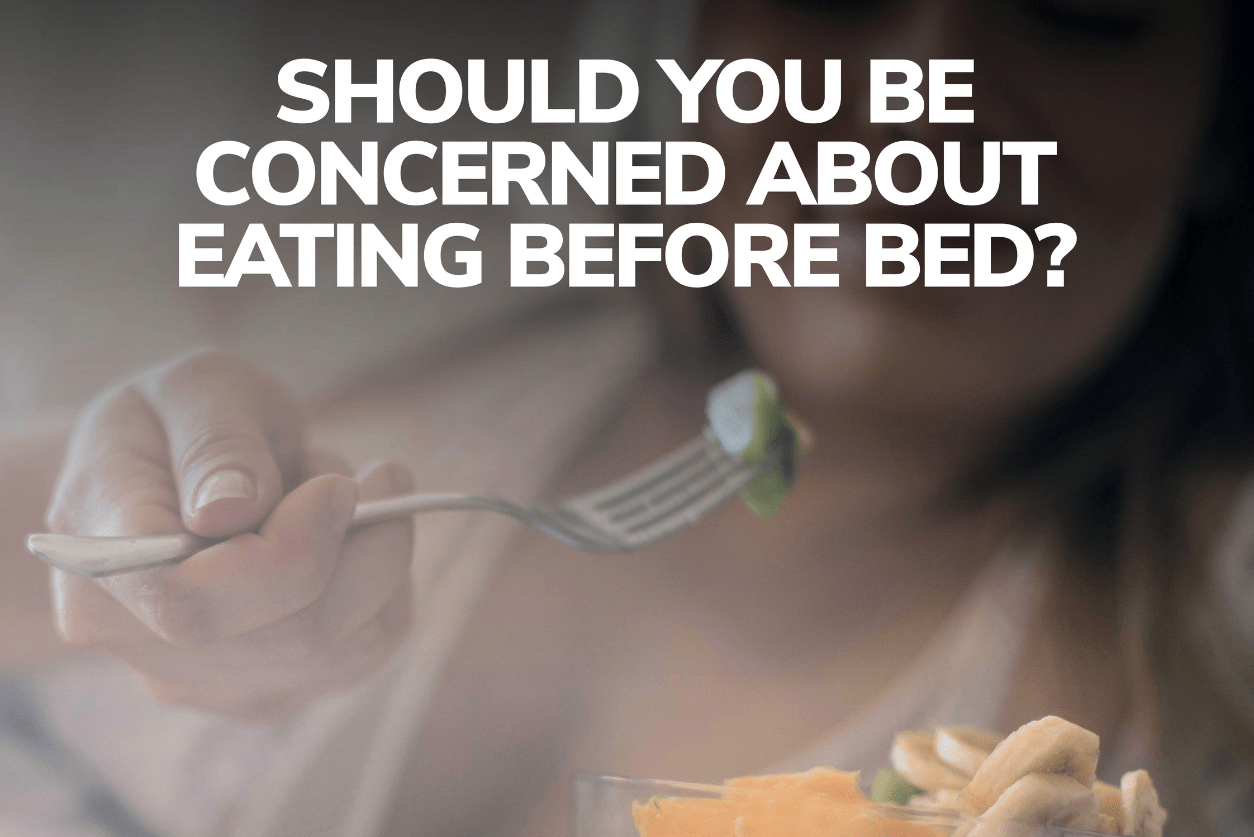
Should You Be Concerned About Eating Before Bed?
In today’s busy world of work, family, commuting, and other social and community obligations, finding the time to sit down for a nice healthy meal can be challenging. Many people’s tight schedules cause them to eat later in the day and sometimes right before bed.
Doctors and other healthcare professionals continue to debate whether eating before bed is harmless or detrimental. Even so, professionals on both sides of the debate have a lot to say.
Eating Before Bed Defined
Many in the medical community define eating before bed as consuming food anywhere from two to three hours before retiring for the evening. Eating does not merely mean a quick or lite snack but a notable amount of food.
Should You Eat Before Bed?
Many gastroenterologists believe the short answer to this question is no. They believe that eating before bed increases your risk of events such as:
A Disrupted Sleep Cycle – Your body typically follows natural patterns known as Circadian rhythms. These cycles help you stay awake during the day and become sleepy during the evening. Eating too close to bedtime may disrupt these patterns, leading to insomnia. Chronic insomnia is linked to many biological and mental concerns.
The Development of Poor Eating Habits – Those who typically eat before bed do so while working on a computer, watching television, reading, or engaging in other activities. Late eaters tend to consume larger quantities of unhealthy foods, containing large amounts of fat, sugar, salt, and chemical preservatives. Eating a lot of fatty, sugary, or salty products increases the risk of weight gain. Consuming junk food also increases your chances of developing potentially serious health problems such as high blood pressure, diabetes, and cardiovascular disease.
Digestion and Eating Before Bed – Our bodies can manage both sleeping and digesting simultaneously. But for most people, going to bed immediately after a meal is not optimal due to the structure of your gastrointestinal (GI) tract.
Eating before lying down can trigger heartburn. Once you consume food, the digestion process begins, and digestive juices like stomach acid are released. While asleep, these substances often back up into your throat and chest, causing the uncomfortable burning sensation of heartburn. Occasional heartburn is normal but experiencing it more than twice a week could indicate gastroesophageal reflux disease (GERD).
Over time, acid backup can lead to a more serious condition known as acid reflux disease. This can result in the erosion of the esophagus’s lining, causing many unpleasant symptoms while heightening the risk of developing cancer.
Nighttime eating can also lead to indigestion (dyspepsia), which includes symptoms like stomach pain, nausea, quick fullness, and upper abdomen bloating or burning. These symptoms can be triggered by eating too quickly, overeating, consuming fatty, greasy, or spicy foods, or drinking excessively caffeinated, alcoholic, or carbonated beverages.
Occasional mild indigestion is typically not a concern. But if it persists for more than two weeks or is accompanied by other symptoms, talk with your gastroenterologist. We recommend avoiding late-night meals and waiting two to three hours after eating before lying down.
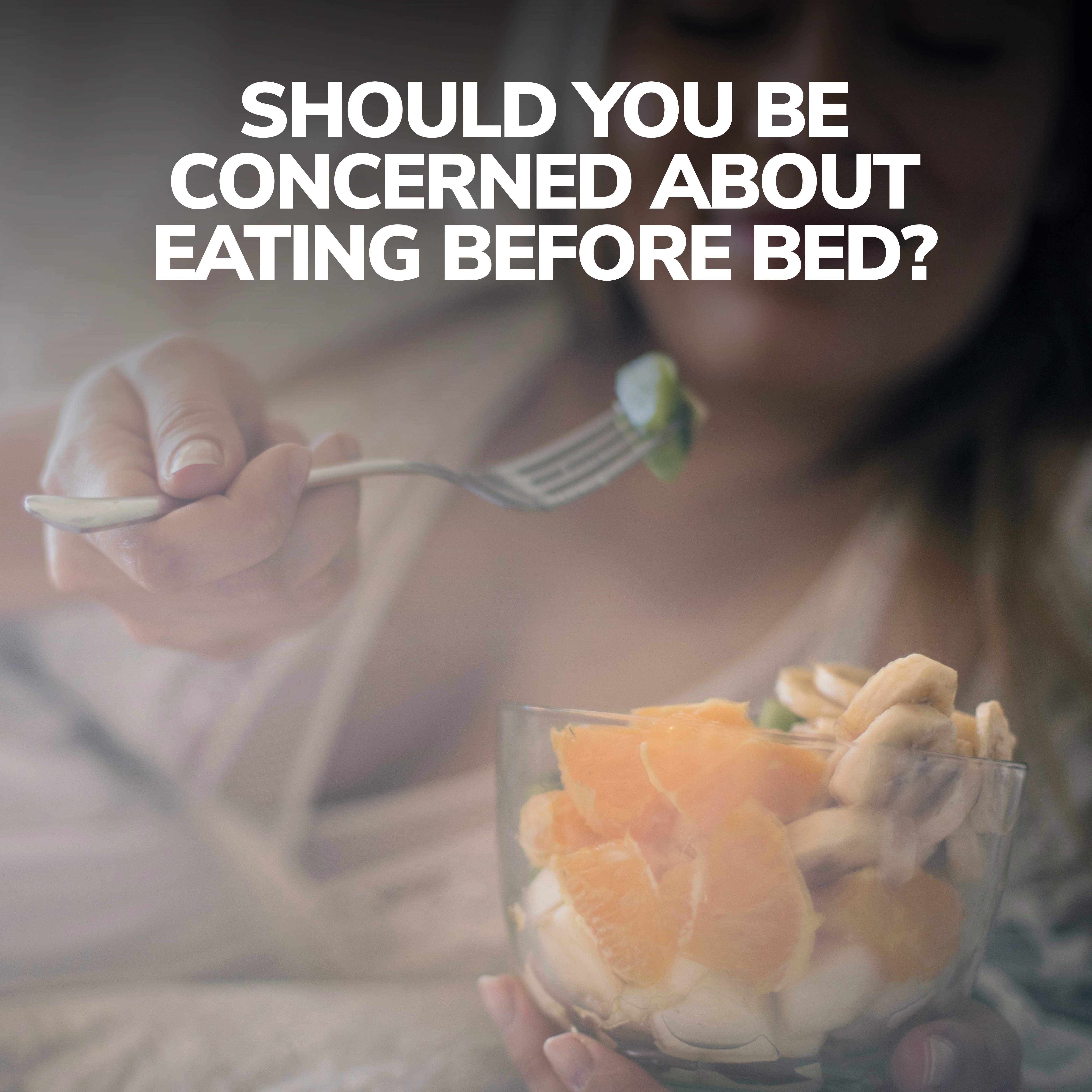
The Counter Argument
Some of the healthcare community maintains that eating before bed can prove beneficial in ways including:
- Systemic Blood Sugar Regulation – Certain studies suggest that food consumption during the evening can stabilize blood sugar, making you less hungry in the morning.
- Improved Sleep – Some scientific investigations have found that eating before bed leaves the body more relaxed and improves the sleep cycle if what you consume is in moderation and not overly loaded with calories.
Foods To Consume Before Bedtime
If you must eat before bed hours, eat sleep-friendly items such as:
- Vegetables, especially carrots, broccoli, snap peas, and grape tomatoes.
- Apples.
- Peanut butter.
- Yogurt.
- Assorted fruit.
- Hummus.
Gastroenterologists recommend these foods because they are not terribly filling, hold relatively low-calorie counts, and contain essential nutrients like protein and healthy fats.
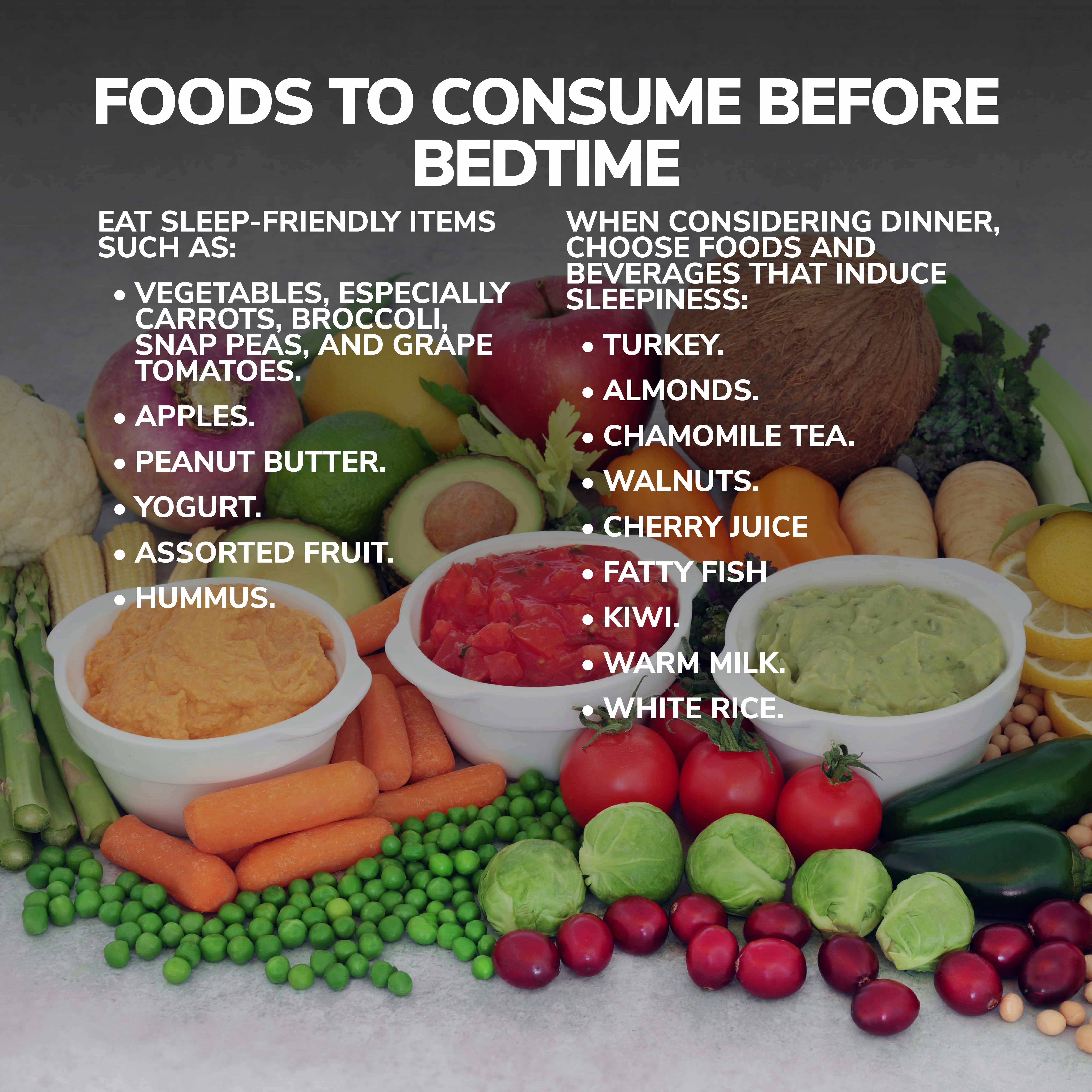
When considering dinner, choose foods and beverages that induce sleepiness, like turkey, almonds, chamomile tea, walnuts, cherry juice, fatty fish, kiwi fruits, warm milk, and white rice.
Foods To Avoid Before Bedtime
Before heading to bed, you should avoid certain foods at all costs, including:
- Caffeinated Products – Caffeine is a powerful stimulant that interferes with your body’s ability to process a chemical labeled adenosine, which is known to promote tiredness. As adenosine levels drop, you grow more prone to bouts of insomnia. Caffeine also possesses diuretic properties, and caffeine consumption can result in increased trips to the bathroom, further disrupting your sleep cycle.
- Spicy Foods – Spices enhance the flavor of many foods. But they often prove detrimental to long and restful sleep. Heavily spiced products have the potential to irritate your digestive tract resulting in bothersome symptoms such as gas, burping, cramping, and heartburn.
- Fatty Foods – Foods with significant fat content often take longer for your gastrointestinal system to digest. At night, this can lead to unpleasant symptoms that can keep you awake.
- Sweet Snacks – Avoid consuming sweet snacks like candy before bedtime. The sugar in such treats provides a quick burst of energy, making falling asleep far more challenging.
- Alcohol – You may be in the habit of enjoying a glass of wine, beer, or mixed drink before retiring for the evening. Alcohol contains sedative properties and, when used in moderation, can provide enough soothing and calm to help you fall asleep.
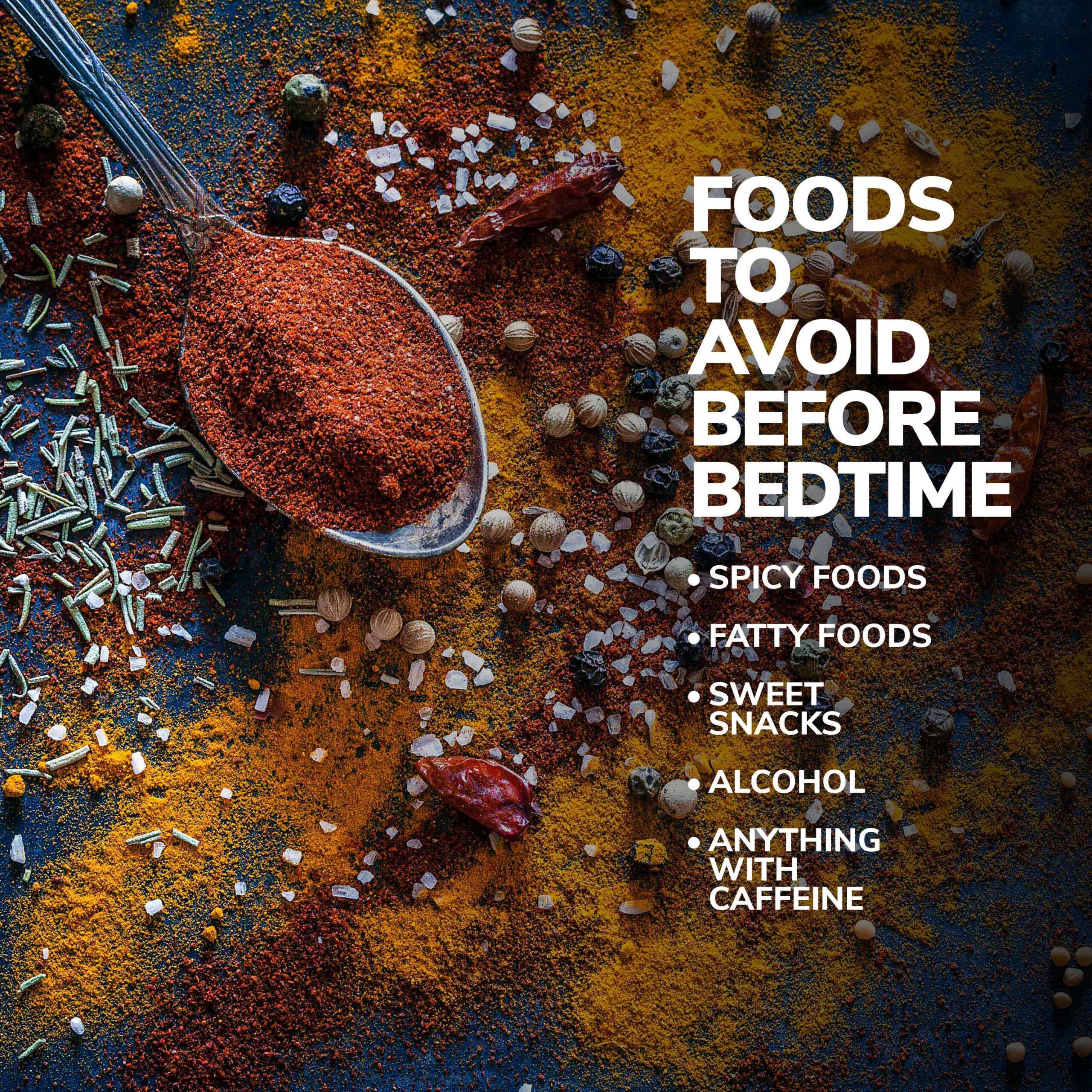
Tips To Avoid Late-Night Eating
If you can avoid eating at night, you should. This task can be easier by following suggestions such as:
- Preparing Food Ahead of Time – If you work late or do not have time to prepare a meal upon arriving home, prepare meals whenever time permits. For example, cook several days’ worth of dinners on Sunday. Meal-prepping ensures that you have enough ready-to-eat food on hand.
- Consuming Healthy Snacks – The trouble with many junk foods is that you simply cannot eat them in small quantities. Any late-night snack should be light fares like fruits and vegetables.
- Keeping Busy – Sometimes, you eat merely out of boredom. This may be avoided by keeping yourself busy before bedtime. Activities like cleaning the house, completing a work-related project, or playing with your children may keep your mind off food. Productive nighttime tasks can also help combat tension and prevent emotion-based or stress eating.
- Satisfying Daytime Cravings – While you are out and about, you may be enticed by ads for, or the sight of, junk foods. When you need to satisfy these cravings, it is best to do so during the daylight hours. Ignoring these urges will only grow more intense and often lead to overindulgence at night.
- Establishing Cut-Off Times – Set food consumption cut-off times if you arrive home relatively early. For example, you may pick 7:30 as the last time you will eat or drink anything.
- Follow An Established Pre-Bedtime Pattern – Observing a nighttime pattern may lessen your desire to snack. An evening ritual like brushing your teeth immediately following dinner may put you in slumber mode and take your mind off food.
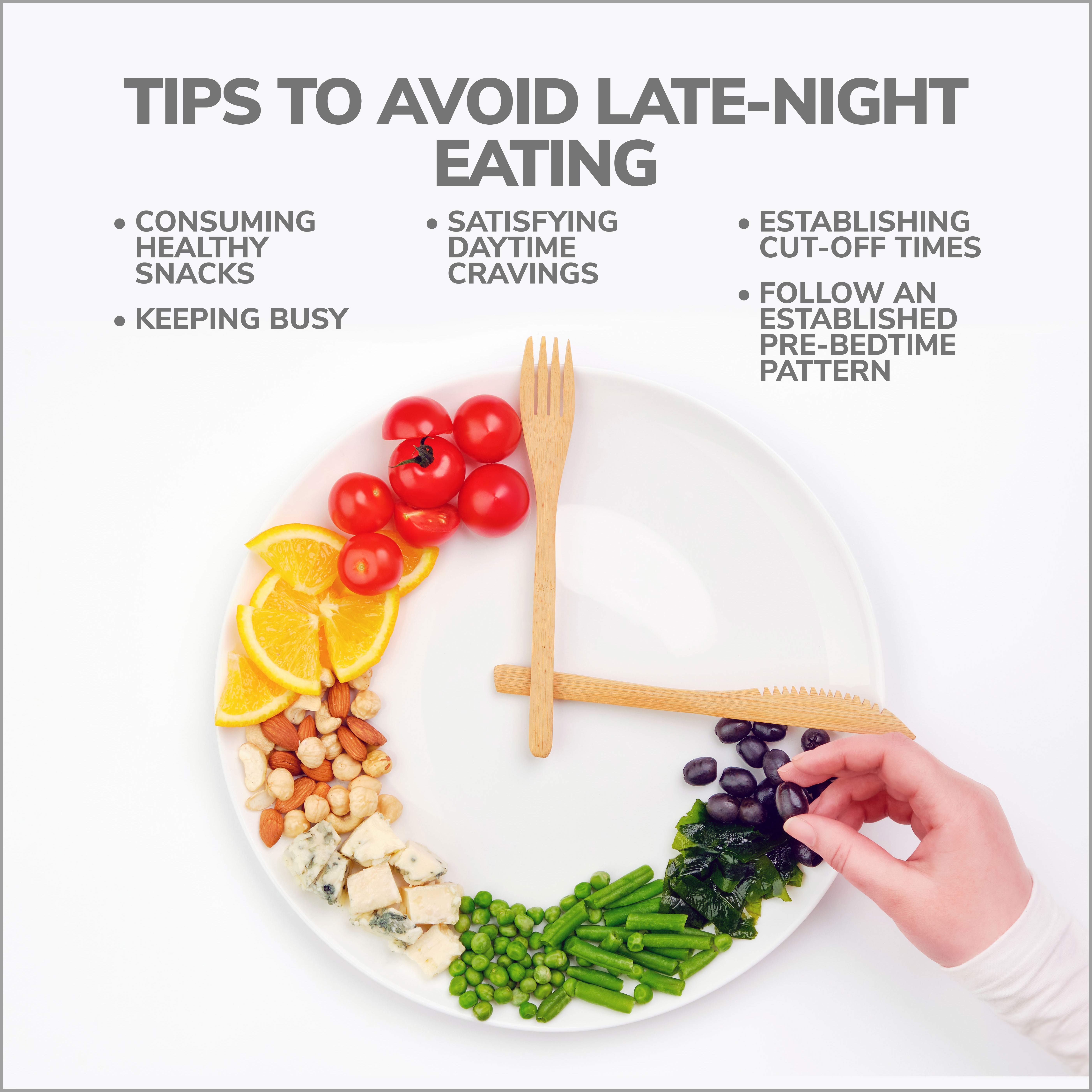
Contact Us
Our practice began more than 15 years ago and has emerged as one of the leading gastroenterology practices in central Florida. We perform a host of diagnostic procedures using state-of-the-art equipment in a friendly, comfortable, and inviting atmosphere where patient care is always a top priority. Contact us today!